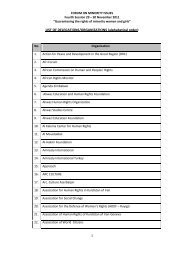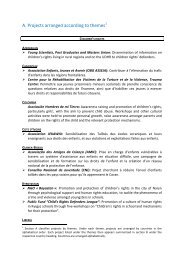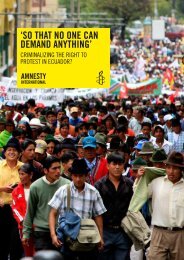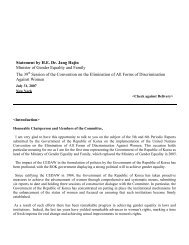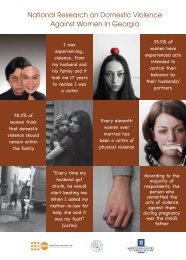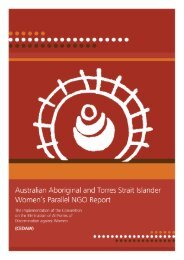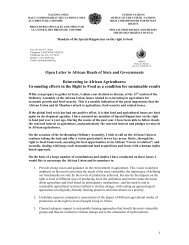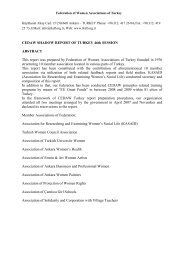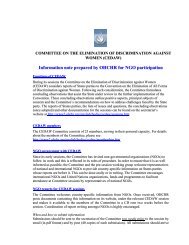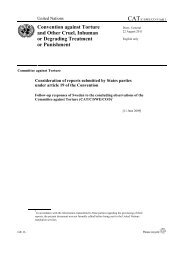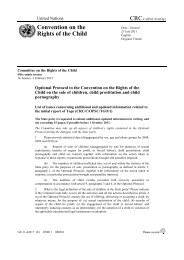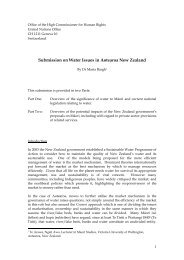Report - Office of the High Commissioner on Human Rights
Report - Office of the High Commissioner on Human Rights
Report - Office of the High Commissioner on Human Rights
- No tags were found...
Create successful ePaper yourself
Turn your PDF publications into a flip-book with our unique Google optimized e-Paper software.
Group 5 – Indigenous (PNG Case)<br />
Case – A daughter married into a different tribe from that <str<strong>on</strong>g>of</str<strong>on</strong>g> her fa<str<strong>on</strong>g>the</str<strong>on</strong>g>r’s. Because she married a man<br />
from a different tribe, she has to make an applicati<strong>on</strong> to <str<strong>on</strong>g>the</str<strong>on</strong>g> tribe if she wants to access land from her<br />
mo<str<strong>on</strong>g>the</str<strong>on</strong>g>r’s tribe. This rule <strong>on</strong>ly applies to daughters - s<strong>on</strong>s automatically get land <strong>on</strong> which to build<br />
<str<strong>on</strong>g>the</str<strong>on</strong>g>ir houses. She must submit her applicati<strong>on</strong> to <str<strong>on</strong>g>the</str<strong>on</strong>g> chiefs (all male). If her applicati<strong>on</strong> is approved,<br />
she has to pay 50 kina. Approval is awarded <strong>on</strong> <str<strong>on</strong>g>the</str<strong>on</strong>g> basis <str<strong>on</strong>g>of</str<strong>on</strong>g>, in part, <str<strong>on</strong>g>the</str<strong>on</strong>g> status <str<strong>on</strong>g>of</str<strong>on</strong>g> her family (i.e.<br />
<str<strong>on</strong>g>the</str<strong>on</strong>g> character <str<strong>on</strong>g>of</str<strong>on</strong>g> <str<strong>on</strong>g>the</str<strong>on</strong>g> family is c<strong>on</strong>sidered, <str<strong>on</strong>g>the</str<strong>on</strong>g> character <str<strong>on</strong>g>of</str<strong>on</strong>g> <str<strong>on</strong>g>the</str<strong>on</strong>g> daughter is irrelevant).<br />
Elements - Security <str<strong>on</strong>g>of</str<strong>on</strong>g> tenure<br />
- Affordability<br />
- Participati<strong>on</strong> (men chiefs <strong>on</strong>ly), status <str<strong>on</strong>g>of</str<strong>on</strong>g> family<br />
Sources - CEDAW, UDHR<br />
- Beijing 1995 – para 58 (m) affordability and accessibility <str<strong>on</strong>g>of</str<strong>on</strong>g> housing<br />
and land<br />
- C<strong>on</strong>stituti<strong>on</strong> (not sure <str<strong>on</strong>g>of</str<strong>on</strong>g> what <str<strong>on</strong>g>the</str<strong>on</strong>g> relevant laws and policies are)<br />
Overriding - Gender equality<br />
Principles - N<strong>on</strong>-discriminati<strong>on</strong> - because she is a woman and because <str<strong>on</strong>g>of</str<strong>on</strong>g> <str<strong>on</strong>g>the</str<strong>on</strong>g> use<br />
<str<strong>on</strong>g>of</str<strong>on</strong>g> family status as a basis for decisi<strong>on</strong>-making<br />
Guarantees - Equality provisi<strong>on</strong>s in c<strong>on</strong>stituti<strong>on</strong>;<br />
- UDHR; CEDAW; BPFA<br />
Obstacles - Customary law<br />
- Lack <str<strong>on</strong>g>of</str<strong>on</strong>g> access to courts (may not be familiar with her nati<strong>on</strong>al laws<br />
and rights)<br />
- Type <str<strong>on</strong>g>of</str<strong>on</strong>g> husband (i.e. character; not involved in community/family<br />
activities)<br />
- Depleti<strong>on</strong> <str<strong>on</strong>g>of</str<strong>on</strong>g> natural resources – since <str<strong>on</strong>g>the</str<strong>on</strong>g> majority <str<strong>on</strong>g>of</str<strong>on</strong>g> land in PNG has<br />
been taken over by government, access to fishing grounds has been<br />
reduced. C<strong>on</strong>sequently, with clan resources now depleted, <str<strong>on</strong>g>the</str<strong>on</strong>g><br />
likelihood <str<strong>on</strong>g>of</str<strong>on</strong>g> women acquiring tribe land, relative to <str<strong>on</strong>g>the</str<strong>on</strong>g> men, is even<br />
less. Once such resources have been exhausted, <str<strong>on</strong>g>the</str<strong>on</strong>g> land will not be<br />
made available for women who are <strong>on</strong>ly sec<strong>on</strong>darily accorded <str<strong>on</strong>g>the</str<strong>on</strong>g>ir<br />
rights after men<br />
Vulnerable<br />
Being a woman, and due to <str<strong>on</strong>g>the</str<strong>on</strong>g> scarcity <str<strong>on</strong>g>of</str<strong>on</strong>g> clan resources, she will be <str<strong>on</strong>g>the</str<strong>on</strong>g><br />
last <strong>on</strong>e to gain access to land. This situati<strong>on</strong> is exacerbated by <str<strong>on</strong>g>the</str<strong>on</strong>g> fact<br />
that all chiefs (who are primary decisi<strong>on</strong>-makers) are men, and because<br />
her ability to access her rights to adequate housing and land is<br />
dependent <strong>on</strong> clan members’ appraisal <str<strong>on</strong>g>of</str<strong>on</strong>g> her husband’s character. Even<br />
if her applicati<strong>on</strong> is approved, she cannot build a suitable permanent<br />
house because <str<strong>on</strong>g>the</str<strong>on</strong>g>y can reclaim <str<strong>on</strong>g>the</str<strong>on</strong>g> land for o<str<strong>on</strong>g>the</str<strong>on</strong>g>r clan purposes, or<br />
simply because <str<strong>on</strong>g>the</str<strong>on</strong>g> clan looks unfavourably <strong>on</strong> her husband’s character<br />
Impact - Insecurity <str<strong>on</strong>g>of</str<strong>on</strong>g> tenure<br />
- Reluctance to invest (e.g. build permanent house)<br />
132 WOMEN’S RIGHTS TO ADEQUATE HOUSEING AND LAND



